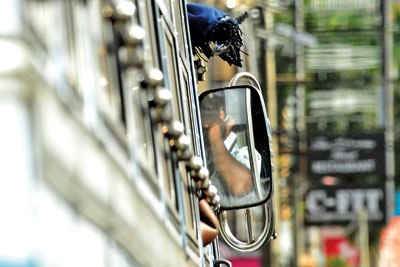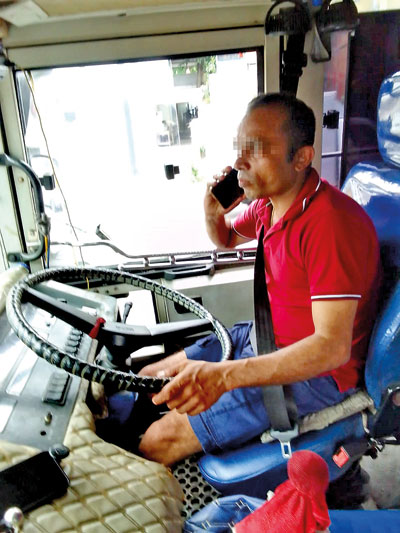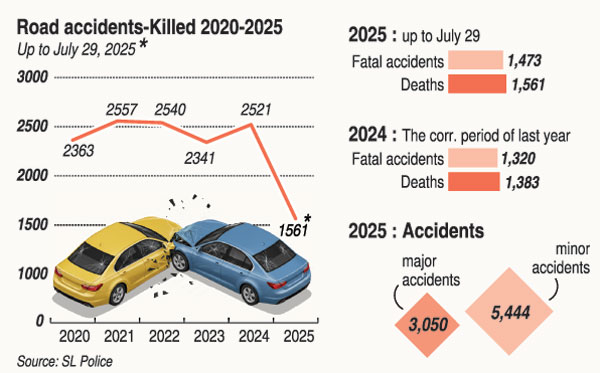News
Drivers using mobile phones must be seen to be booked
View(s):By Minaza Hassan
Although laws prohibit mobile phone use while driving, enforcement often relies on visual confirmation by police officers, which makes offences like mobile phone use or quick lane violations harder to detect unless there is camera footage.
Collective responsibility and awareness are needed as laws such as the prohibition of mobile phone use while driving among other road rules continue to be neglected, contributing to the persistently high rate of road traffic accidents, said Deputy Inspector General (DIG) in charge of the Traffic Control and Road Safety Unit, Indika Hapugoda.

Often, in an accident, it can be difficult to determine if a driver had been using a mobile phone while driving and if that had been a contributory cause
According to police reports, most road traffic accidents in the Western Province have occurred in areas like Gampaha, Nugegoda, and Kelaniya, and over 1,000 fatalities have been reported in the past six months alone.
“A challenge in enforcing the prohibition on mobile phone use while driving is that it often requires police officers to visually catch the offender in the act. Many drivers tend to stop using their phones when they notice a police presence and resume the behaviour once they believe they’re no longer being observed. This makes it difficult to consistently detect and prosecute such violations, as the offence is often momentary and easy to conceal,” explained DIG Hapugoda.
Often, in an accident, it can be difficult to determine if a driver had been using a mobile phone while driving and if that had been a contributory cause. However, a call log history of the driver may provide clarity in such cases. Subsequently, available CCTV footage would also help affirm the case, said DIG Hapugoda.
In addition to the precautions taken by drivers, pedestrians also have a responsibility to be vigilant and to avoid using mobile phones while on the road especially when they are crossing it, said DIG Hapugoda.
Pedestrians should not assume safety automatically simply because they use a pedestrian crossing. While pedestrian crossings are designated for safe road use, it remains essential for pedestrians to be alert, ensure traffic has stopped from both directions, before crossing. Road safety is a shared responsibility, explained DIG Hapugoda.
For instance, if a pedestrian were to cross a road without taking precautions, it can lead to an accident as the driver may be unable to brake in time due to a pedestrian appearing unexpectedly, added DIG Hapugoda.
Accidents are often a result of factors such as negligent driving, or speeding, said DIG Hapugoda, highlighting the common element of human error as the contributing factor.
To ensure road safety, a change of discipline towards road rules is needed from from everyone, said DIG Hapugoda.
The traffic control and road safety unit of the police has done awareness workshops in schools, said DIG Hapugoda.
Furthermore, plans to implement stronger laws on speed limits and to introduce a CCTV system in place of better surveillance and enforcement of road rules are ongoing, said DIG Hapugoda. 
Echoing similar thoughts, Dr. Niranga Amarasinghe, a professor at the department of civil engineering at Sri Lanka Institute of Information Technology (SLIIT) who has also worked on studies related to road safety, said awareness and education on road safety are important. But, while some road safety content is included in the school curriculum, it is still not enough.
For instance, students may first encounter it in Grade 5 and again around Grade 8, but the frequency is too low. Road safety needs to be reinforced regularly and students should be reminded of these rules more consistently through brief refreshers, said Dr. Niranga, highlighting that the lack of continuous road safety education is a concern.
Drivers may learn road rules during their driving test, however, over time, they tend to adopt the habits of the general driving population. Priorities shift and they begin focusing more on timing, convenience, or speed, rather than abiding by road rules. This gradual decline in compliance suggests that both early education and ongoing public awareness are crucial, said Dr. Niranga.
Additionally, in conversations about road safety, pedestrians are often overlooked. While focusing on whether they follow road rules, it is also important to examine the behaviour of drivers.
At pedestrian crossings without signals, for instance, people often may have to wait a long time because vehicles do not give way. Eventually, there’s what you might call an ‘endurance time’, once that patience runs out, pedestrians end up crossing even while vehicles are approaching. It’s not just about drivers, but also other road users, Dr Nilanga said. There is a broader issue that calls for a change in mindset and discipline among all road-users.
Law enforcement plays a role and stricter enforcement may lead to more people following road rules, however it may not always be practical to station police officers everywhere monitoring traffic at all times, said Dr. Niranga.
Education, raising awareness and fostering long-term behavioural change is what is really needed as law enforcement alone isn’t enough when addressing a cultural issue, she said.
People often forget the severe consequences of not adhering to road rules. Following road rules isn’t just about avoiding fines, it can save lives and reduce medical costs, said Dr. Niranga.

| Road crash deaths rise to 1,500 so farThis year more than 1,500 people have died in road accidents so far, an increase over the corresponding period of the past year. According to police statistics, up to July 29 there were 1,473 fatal accidents, while 1,561 deaths were reported. In the corresponding period of last year there were 1,320 fatal accidents and 1,383 deaths. This year there were also 3,050 major accidents and another 5,444 minor accidents reported to the police. Some accidents are not reported to the police as some of them have been amicably settled between those involved. | |
The best way to say that you found the home of your dreams is by finding it on Hitad.lk. We have listings for apartments for sale or rent in Sri Lanka, no matter what locale you're looking for! Whether you live in Colombo, Galle, Kandy, Matara, Jaffna and more - we've got them all!

